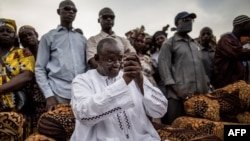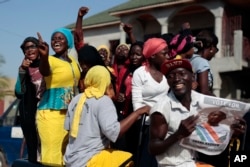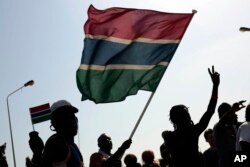Gambians across Africa and elsewhere rejoiced at the news Friday that longtime ruler Yahya Jammeh had conceded defeat in the country's presidential election.
Celebrations erupted in the streets of the Gambian capital, Banjul. Sulyman Sawaneh, 19 and unemployed, was ecstatic.
"Gambia, we are suffering for 22 years," he said. "This guy didn't do nothing for us."
Amie Touray, a 22-year-old student, said she finally felt some freedom.
"We are so happy today," she said. "Today's the day we stand on our feet and we give free speech. We can say anything we want to say without any soldier or any police harassing us or anything."
Cherished event
For Buba Fatty, a 32-year-old medical worker, the election result was a dream come true.
"I think I'm one of the happiest guys today throughout the whole world, because this is what I've been looking for for so many years," he said.
The Independent Electoral Commission announced Friday that winner Adama Barrow won 45 percent of the total votes, while Jammeh took about 36 percent. A third candidate, Mama Kandeh, won 17 percent.
Christopher Fomunyoh of the National Democratic Institute spoke to VOA by phone from Accra, Ghana, where he was getting ready to observe presidential elections there in a few days.
"In the past two decades we've seen many violations of human rights, many lawyers, journalists and human rights activists imprisoned," he said. "So it comes as a relief that someone who said he would never relinquish power has accepted the verdict of the polls."
Jammeh, 51, has ruled the small West African nation since taking power from Dawda Kairaba Jawara in a military coup in 1994. Fomunyoh said this was very significant.
Coup was a 'shock'
"The early '90s, Gambia was one of only four African nations — the other three being Senegal, Botswana and Mauritius — these were the only four countries that even accepted political pluralism," he said. "It came as a shock when Yahya Jammeh staged a coup in 1994 and took the reins of government. Very quickly, he moved from being a benign soldier to a very autocratic leader."
Barrow was the candidate for a coalition of seven opposition parties. Ousainou Mbenga, chairman of the Democratic Union of Gambian Activists, based in the U.S., said he and his friends couldn't be happier that the Jammeh regime was over.
"A brutal regime, a tyrannical regime, very selfish. Jammeh has really pushed Gambian progress [back] another 50 years," he said.
Mbenga said the election began a new era in the history of the Gambia. He added that people should start working on building strong institutions to prevent someone like Jammeh from ever ruling the country again.






